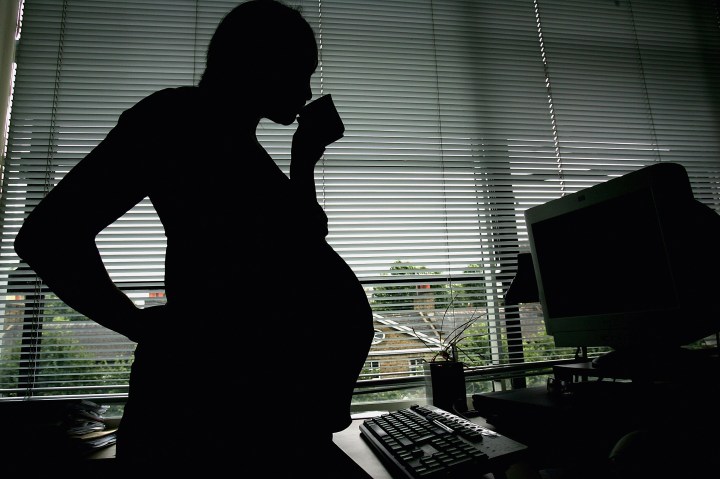
New federal law seeks to protect pregnant workers

Earlier this week, a new federal law aimed at protecting pregnant workers went into effect.
The Pregnant Workers Fairness Act requires employers of at least 15 people to provide accommodations to pregnant and postpartum workers, unless the accommodation will cause “undue hardship.”
While there have been pregnancy protections in place for a while now, safeguards for pregnant workers haven’t been entirely effective, says Gillian Thomas, a senior staff attorney at the ACLU’s Women’s Rights Project.
Marketplace’s David Brancaccio spoke with Thomas about the details of the new law.
David Brancaccio: There have been protections in place for pregnant workers. But there were holes in the system, from your point of view.
Gillian Thomas: There were major gaps. The Americans with Disabilities Act, which has been the law of the land for over 30 years, provides for accommodations for workers with disabilities but pregnancy, at least without complications, is recognized to not constitute a disability, when you’re talking about things like morning sickness, or just needing to go to a prenatal appointment. But the Pregnancy Discrimination Act, which has been law since 1978, only protected pregnant workers needing those kinds of accommodations, to the extent that the employer provided those accommodations to others, similar in their ability or inability to work. And for years, both employers and the courts have been struggling with defining who is similar. And frequently it was decided to the detriment of the pregnant worker. And so millions of people literally were left without protection.
Brancaccio: This new law comes into effect. And you know, people are gonna have to get their heads around this. It requires employers to provide pregnant workers with “reasonable accommodations” unless the accommodations will cause “undue hardship.” I mean, we need a lawyer like yourself to help us explain this.
Thomas: Employers have actually been providing reasonable accommodations to workers with disabilities under the Americans with Disabilities Act [ADA] for more than three decades. So this is really just expanding the ambit of workers entitled to accommodation. So the concept of “undue hardship” is borrowed from the ADA. The concept of the interactive process that employers are supposed to engage in with employees to identify what is a reasonable accommodation, that’s been in place for over three decades. So this isn’t foreign, we’re not starting from scratch here. The idea is to take that existing scheme and just incorporate pregnant workers into it. The hope also is that because pregnancy is obviously by nature, a temporary condition that what may impose an undue hardship on an employer, when you’re talking about someone who has a permanent disability, that’s going to be different when you’re talking about a pregnant worker who’s obviously not going to permanently be in that condition.
Brancaccio: Yeah, and I mean, give us a sense, who should be really focused on this, who stands to benefit the most from the effects of this law?
Thomas: Millions of workers who are in jobs that are physically demanding are going to be the chief beneficiaries of this new statute. And that ranges from low-wage workers who do really physically strenuous work, whether it’s retail workers who are on their feet all day long, custodians who work with hazardous chemicals, workers like nurses or home health aides who lift patients in and out of bed. And the workers who are in those positions are disproportionately Black and brown women, women who by the way, are at greatest risk of complications from pregnancy. And then there are also the women who are working in jobs that are historically male dominated, where the employer may not even have thought about pregnancy much before. So police officers, firefighters, people who do dangerous work on a daily basis, those are the chief beneficiaries of this law. But really anybody who needs some sort of temporary accommodation, more frequent breaks, maybe a change in their schedule to accommodate severe morning sickness, and then also leave which can be taken intermittently to cover doctor’s appointments or recovery from childbirth and conditions like postpartum depression or lactation, all of those things are covered within the new statute.
Brancaccio: So in virtually every case, the process would start with a conversation between employees and manager. But if the employee doesn’t like the answer, I guess part number two would be ‘Hey, there’s a new law in effect.’
Thomas: That’s right. Really, the hope is that this statute is not going to lead to lots and lots of new litigation, but is actually going to avoid litigation by encouraging cooperative conversations between employers and employees. The interactive process that’s been in place for so long under the ADA is something that employers are now practiced at. And it involves the worker coming forward with describing what their limitations are, what they can and can’t do, the employer providing some different alternatives. And the employee maybe comes back and says, ‘Well, I can do that but not this,’ and hopefully a resolution comes about relatively quickly and cooperatively. In the worst case scenario when that’s not possible, then the next step is yes, going to the enforcement regime. The Equal Employment Opportunity Commission [EEOC], the federal agency that enforces the nation’s anti-discrimination laws, has authority over the PWFA [Pregnant Workers Fairness Act] and has started accepting, what are called charges of discrimination. And that’s the first step for a worker who has tried everything and has not been able to get the accommodations they need. And if the EEOC process is not successful in finding a resolution, then the final resort is the courts.
Brancaccio: Right a key takeaway is there is an infrastructure in place under the Americans with Disabilities Act that can guide this. It’s not that employers are now starting from scratch with this new law.
Thomas: That’s absolutely right. And in addition, because of the gaps in federal protections that have existed for many years, more than 30 states and localities have taken action to enact some version of a pregnancy accommodation statute. And so those employers in those 30 states and localities have also been complying not only with the ADA, but also potentially with pregnancy accommodation laws in their jurisdiction. So, again, the hope here is that this is not revolutionary, that it’s not seen as unduly burdensome to employers, but rather that it’s just expanding the universe of workers who are entitled to these protections.
There’s a lot happening in the world. Through it all, Marketplace is here for you.
You rely on Marketplace to break down the world’s events and tell you how it affects you in a fact-based, approachable way. We rely on your financial support to keep making that possible.
Your donation today powers the independent journalism that you rely on. For just $5/month, you can help sustain Marketplace so we can keep reporting on the things that matter to you.


















